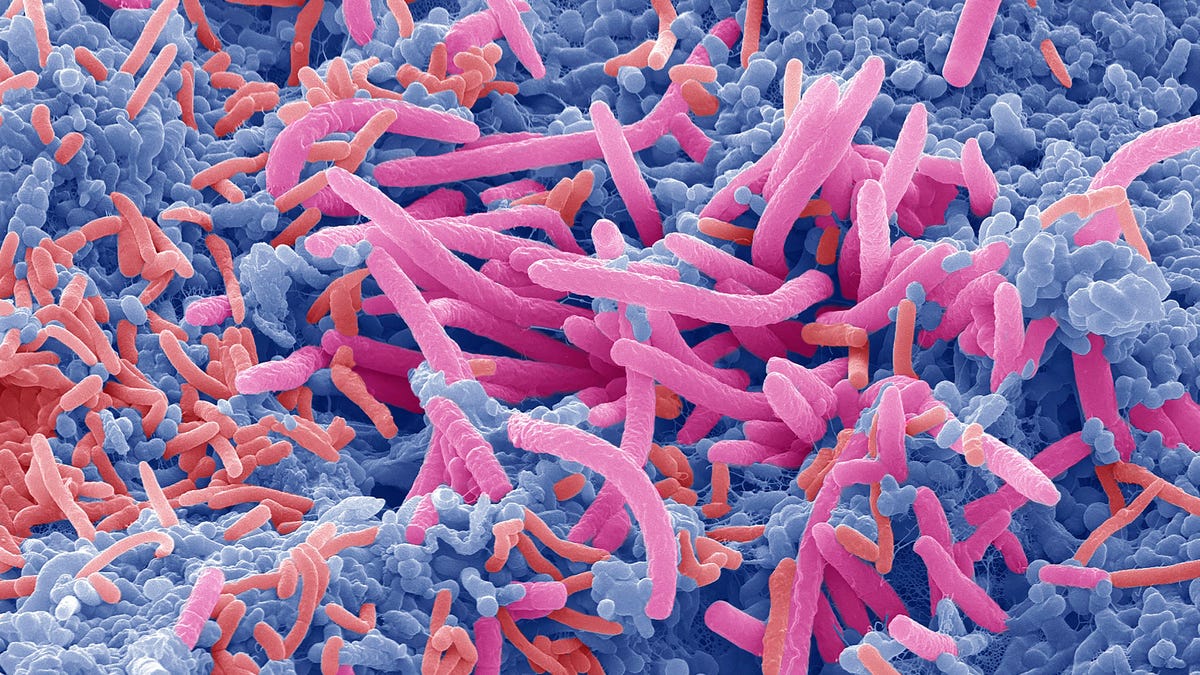Fecal matter transplants: The cure of the future
How someone else's poop can treat gut infections, depression and more.

Trillions of bacteria live safely in your gut, but sometimes they can turn into a problem.
It may seem gross, but transplanting fecal matter from a healthy donor is an increasingly common treatment for someone with an infected gut. Tens of trillions of microorganisms live in our gut, and if their balance gets out of whack, it can cause all sorts of unpleasant problems.
Beyond digestion issues, scientists believe that fecal matter transplants may one day be the cure for a ton of different ailments (including possibly Alzheimer's disease and cancer), so let's get into what they are and how they're done. Just maybe don't read this while eating.
What is a fecal transplant used for?
C. diff infections are extremely unpleasant.
Fecal matter transplants, or FMTs, are used to treat stomach issues caused by C. difficile colitis. C. diff is a type of bacteria that can cause a gut infection that causes nasty conditions like diarrhea, nausea and fever. The infection often is the unfortunate side effect of antibiotic treatment, or an extended stay in the hospital, but C. diff bacteria is found everywhere -- in soil, water and even some food products.
People first take another round of antibiotics to treat the C. diff infection, but for some it keeps coming back. A FMT is used to treat patients who don't respond to the antibiotics. The fecal transplant is also used to help to rehabilitate the balance of bacteria in the patient's gut. Repeated doses of antibiotics destroy our gut environment -- the medicine changes our gut environment in a way it might not be used to, and increases the amount of pathogens, or bad bacteria.
Technically, in a fecal transplant, it's not the fecal matter that's doing the work -- it's the healthy bacteria from the donor that helps the donee reestablish a healthy gut flora.
How does a fecal transplant work?
Think of it as a healing potion, not someone else's poop.
The patient on the donating end of the equation prepares for a colonoscopy, and this is all that the procedure really feels like for them. Without getting into too much detail, the donor strains the liquid out of their fecal sample after it has been thoroughly mixed with water, and ends up with a brown liquid with the healthy bacteria in it. I don't want to ruin tomorrow morning for you, but the end result looks like a cup of coffee.
The patient who receives the FMT is given Imodium, then is sedated, and the liquid is injected into their colon through a colonoscopy tube. After they wake up, the longer they hold their stool, the more time the healthy bacteria has to establish itself in their gut.
The donation usually comes from family or friend, but some studies have shown that this sensitivity is not necessary and a successful fecal transplant can come from any stranger that meets the conditions. There's a few public stool donation registries popping up, but personally I'd only want to get that intimate with someone I already know.
The process for becoming a donor is a bit rigourous -- sometimes you have to commit to going to the lab two or three times a week to make sure that your gut biome is healthy enough -- but a lot organizations will reimburse you for the hassle.
Did the FDA ban fecal transplants?
In June 2019, the FDA issued a warning directed at health care providers using FMT after two immunocompromised adults suffered infections, and one of them ended up passing away. Now, the FDA has new safety measures for FMT, including screening donors and testing donor stool for drug resistant organisms. They also recommend that organizations educate patients on all of the risks of the procedure, so that people can make fully informed decisions.
The FDA still classifies fecal transplants as "investigational," which just means that they recognize that while the procedure comes with risks, that FMT is a last resort that people may be willing to undergo when faced with an otherwise untreatable condition.
What else can fecal transplants cure?
Currently, FMT is only commonly used to treat C. diff infections. There are several clinical studies investigating fecal transplants as a cure for Crohn's disease and IBS.
The future for fecal transplants looks bright. Because of the incredible gut-mind connection, FMT is being proposed to cure depression and anxiety, alcohol addiction and even obesity and cancer.
Where can I get a fecal transplant?
No matter what a quirky lifestyle blog tells you, you should never do a fecal transplant at home. It's not safe without a doctor's supervision, and you could seriously mess up your gut.
If you suffer from a C. diff infection and it's not responding to other treatment, you can ask your doctor about getting a FMT. Or, you can use this map from Open Biome, a nonprofit stool bank, to find a doctor near you that performs fecal transplants.
The US National Library of Medicine also runs clinical trials, so if you have other gut conditions and want to try FMT, you can check if they are performing any trials near you.
The information contained in this article is for educational and informational purposes only and is not intended as health or medical advice. Always consult a physician or other qualified health provider regarding any questions you may have about a medical condition or health objectives.

